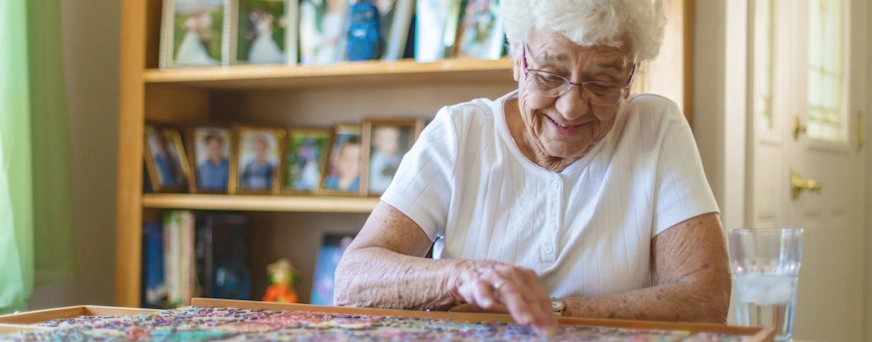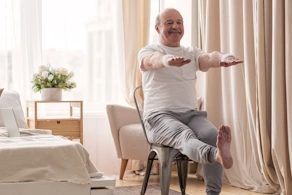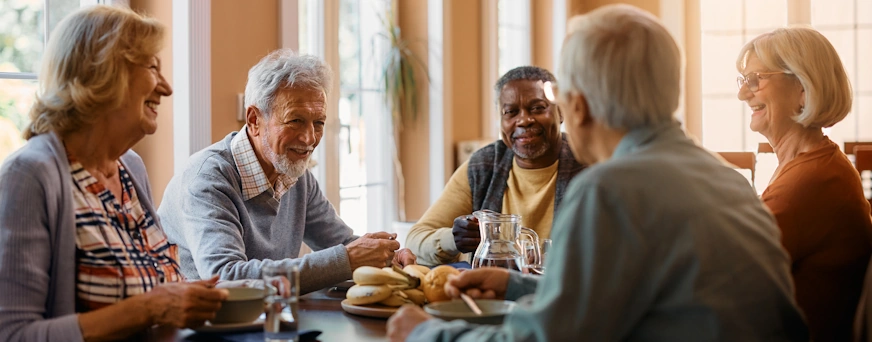Improve Memory Recall with Memory Exercises for Seniors
Our Key Takeaway
Memory exercises like puzzles, reading, learning instruments, or a new language help seniors sharpen recall, attention, and processing skills. Paired with social interaction, regular rest, and physical activity they support brain health and slow memory decline.
Our lives on earth are short. From birth, we race against time. Age does not just impact physical health. Our ability to focus, remember, process info, and do simple tasks is also affected.
We all grow old with time. But we can do some things to make getting old easier.
For instance, memory exercises for seniors. Memory exercises do not cure issues with the brain, but they can help slow down the brain getting worse.
If you are concerned about memory issues for yourself or a loved one, it may also be a good idea to consider a medical alert system. In the event of unexpected emergencies, a medical alert system can ensure help is on the way when it is needed most. Read our Buying Advice page and learn how to choose the perfect medical alert system.
In this article, we will explore how memory exercises are helpful for seniors, along with some examples of these exercises.

Life Assure Product Quiz
Take our 30 second quiz and discover which Life Assure medical alert device is the right fit for you or a loved ones.
Life Assure Product Quiz
Take our 30 second quiz and discover which Life Assure medical alert device is the right fit for you or a loved ones.
Do Memory Exercises Work For Seniors?

If you search for memory exercises for aged people, you’ll find hundreds of online brain training exercises and courses. These online courses aim to promote cognitive functioning and information retention.
It is essential to know that only doing memory exercises does not help. Sleep, exercise, and social time are also needed to keep your brain working well.
Those activities can aid older people in improving their skills to make and keep memories. The activities are good for seniors.
They help people remember things better and remember information longer. However, memory exercises for elderly people cannot prevent neurodegenerative diseases like Alzheimer’s or dementia. In these cases, more protective measures are often necessary. A GPS tracker for seniors can help keep seniors with Alzheimer's or dementia safe, even in the event of wandering.
Recommended Memory Exercises For Seniors

The following is a list of helpful and wonderful memory exercises for seniors-
1. Learn to play a musical instrument
Did you ever want to learn an instrument? Were you too busy with your family or job? Retirement can be a great time to learn music without the old distractions.
Learning to play a musical instrument later in life is one of the greatest memory exercises for aged people. Learning entails engaging your brain in a sophisticated and physically dexterous activity. It also encourages socialization with a trainer or other learners.
2. Do word puzzles
Word puzzles, such as word searches, crosswords, boggle, Wordle, and Hangman, are excellent memory exercises for the elderly.
Word games give fun while using your mind, memory, and focus skills. You can find many easy online word puzzles to play with other people.
3. Solve a jigsaw puzzle
Making a puzzle is a fun game that helps the brain. It calms seniors. It makes them less worried and lowers high blood pressure.
Additionally, this activity is considered one of the best memory exercises because it demands visual-spatial reasoning and memorization.
4. Read fictional books
Reading is an incredible activity for all ages. However, it poses several additional benefits for senior citizens. Reading fictional books invokes their imagination and cognitive skills, along with enhancing their vocabulary.
It also stimulates their memory as to follow the story, they must remember crucial characters, plot details, and storylines.
5. Exercise daily
Many studies over the years have shown that being active every day helps older people get stronger and better at balancing. Daily exercises can make the body and mind healthy.
Furthermore, low-impact aerobic exercises improve our body’s intake of oxygen to produce energy. If you are already into sports, then challenge yourself by learning a new sport.
6. Do math
Memory exercises involving math, like counting backward or mental math, are simple yet effective. The math problems do not need to be super tough but they should be solved without the aid of pen, paper, or calculator.
If you are not a fan of math, then simply count backward from a high number. Studies show that solving simple math problems can enhance the cognitive abilities of seniors.
7. Learn a new language
Learning a new language may appear frightening. However, it poses a challenge to our brain, enhancing brain health and reducing the impact of aging.
There are many ways to study a new language. One way is to join online classes. Another way is to go to a study center.
Going to a study center can be good. It lets you meet people from different backgrounds. You get real practice talking to new people. You might learn different customs too.
Apart from the socialization component, learning a new language involves concentrating on sound and pronunciation, stimulating the brain.
8. Learn new dance moves
Big fan of dancing? Then learning new dance moves is right up your alley. Learning new choreography is an excellent mental and physical exercise.
It's because learning new choreography involves remembering dance moves and matching them with the tempo and feel of the music. Additionally, it involves adapting to the dance moves of the people around you and being flexible to the change.
9. Take a cooking class
Although it might not seem like it, cooking is one of the most exceptional memory exercises. How? Well, learning to cook a new cuisine uses many of your five senses.
Associated activities with cooking, such as meal planning, multitasking, organizing, altering the recipe, and creating a grocery list, also engage our cognitive abilities.
10. Start an art project
Tactile hobbies like creating 3-D clay models, knitting, crocheting, or building airplane models are wonderful for your cognitive and coordination skills.
Usually with activities like crocheting and knitting, one has to remember the patterns and sequences of the yarn. This requires concentration and focus, thereby enhancing memory.
11. Volunteer in the community
Post-retirement life can be lonely for many senior citizens, especially the ones who enjoy working. Despite having hobbies, many people feel unfulfilled. Volunteering at a pet shelter, hospital, or school can help the seniors engage socially in society.
12. Play video games
Many claim that video games are harmful to people. Studies show that video games are an incredibly stimulating activity for adults that can positively impact their mental health. Playing different video games can be a rewarding avenue of memory exercises for aged people.
This is because it requires paying attention to visual and auditory cues to accomplish tasks and promotes cognitive functioning via multitasking. Several online games are currently available that are geared specifically towards the elderly.
Conclusion
In conclusion, memory exercises for seniors are a fantastic way to maintain senior citizens’ cognitive health and improve memory recall.
Memory exercises can help senior citizens decrease the progression of neurodegenerative diseases. It does so by keeping the mind and body engaged in memory and cognitive skills.












 Get Help With The Push Of
A Button
Get Help With The Push Of
A Button















